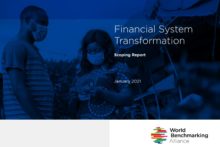With the support of the FCDO IMPACT Programme, the World Benchmarking Alliance (WBA) is developing a benchmark that will assess and rank the world’s 400 most influential financial institutions on their contribution to globally agreed goals. Namely, the SDGs, Paris Agreement and UN Guiding Principles on Business and Human Rights.
This week, WBA launched a Scoping Report that lays out our initial thinking. It is informed by three months of consultation that gathered insights and perspectives from almost 250 individuals across 19 countries. WBA supplemented this with 100 interviews with experts around the world, and are grateful to the many insights gathered over time from our Alliance of 200 institutions. Together they represented stakeholder groups from across the financial system, providing insights on the impact of the financial system and how such a benchmark might help accelerate the transformation needed. The conclusions?
- There is a desire to understand financial institutions’ contributions to globally agreed goals, rather than to self-defined determinations of sustainability. The rise in sustainable and impact investing has seen an increase in disclosures of performance at the enterprise or portfolio level. But these can lack comparability, not least because what is defined as sustainable or impactful is too often “self-defined”– relative to past performance or the performance of peers – as opposed to being defined in line with globally agreed goals. Standards and frameworks are emerging to enable such reporting that are specifically designed for financial institutions. Most are focused on climate mitigation. The proposed benchmark could act as an accountability mechanism for such commitments, but also incentivise the contribution of financial institutions to the development of much-needed frameworks in other areas of global need.
- Failure to meet the global goals poses systemic risk to keystone financial institutions. As noted by insurers and reinsurers at a recent Principles for Sustainable Insurance event, their business model might be viable in a 2 degree world, but it is not in a 4 degree world. Climate change is increasingly recognized by regulators as posing systemic risk, with biodiversity loss under increasing scrutiny. The United States is not alone in grappling with the implications of inequality – economic, gender and racial – for financial markets. These issues affect financial institutions – particularly the world’s most globally influential and interconnected, who also impact these issues.
- A benchmark that compares the contribution of the world’s most influential financial institutions, across industries and across regions, could help accelerate progress. Although a failure to meet global goals affects us all, it is most acutely felt in the global south. The 400 institutions in scope are largely headquartered in the global north, reflecting global financial centres. More than 80% of global capital flows to high-income countries, with flows to low-income countries negligible. Yet while the profits from these capital flows aggregate in the global north, their impacts (both positive and negative, intended and unintended) are felt globally. A benchmark will not resolve the inequity of these global flows, but by focusing on the world’s most influential institutions, it may indicate where specific institutions and clusters of institutions (by industry, by region) are leading, or lagging.
As we move now to methodology development, WBA will strive for a universal benchmark that takes the global goals as its ‘denominator’, covers key industries and regions, and is publicly accessible. When designing benchmarks, WBA aims to be relevant, responsive and iterative, and complementary. WBA therefore intends to amplify existing, aligned initiatives – highlighted in the scoping report – via the benchmark wherever possible. Having surveyed the burgeoning landscape, WBA thinks that such a benchmark could help accelerate and amplify existing initiatives, incentivising a race to the top.
Next steps
This Scoping Report marks the first milestone towards the development of WBA’s Financial System Benchmark. In the spirit of collaboration and alignment that is at the heart of WBA’s global, multi-stakeholder Alliance, we are inviting feedback on the Scoping Report. Do you think the proposed scope of and approach to the benchmark will lead to the transformation needed? What have we missed? What opportunities for collaboration do you see?




